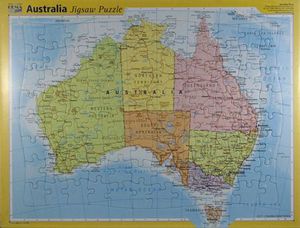
There are very few educational experiences that have the potential to teach such a varied range of skills to your kids. Some of these skills are, physical skills that are formed by holding the jigsaw puzzles pieces and turning the puzzle pieces until they fit into the place they belong. Kids also learn cognitive skills by solving the problem of the jigsaw puzzles and emotional skills are also learnt, such as patience and perseverance. Another benefit is kids feel rewarded at the end when the jigsaw puzzles are complete.
There is educational value in all types of jigsaw puzzles. The skills acquired and practiced in completing jigsaw puzzles are a part of successful learning. Doing jigsaw puzzles develops several functions of the brain at the same time while a child is having fun and also learning. The ability to reason, deduce, analyse, sequence and develop logical thought and problem solving skills are developed. To complete jigsaw puzzles, a child will develop eye-hand co-ordination which develops a relationship between what their eyes see, what their hands do and what their brain relates to this information.
Educational jigsaw puzzles are designed to teach a specific learning objective. An example of this might be a jigsaw puzzle map of the world, or a jigsaw puzzle of the solar system. To get the most out of the educational value of jigsaw puzzles, it needs to be part of the learning process, but not all of it. Children have different styles of learning, so an advantage of doing a jigsaw puzzle is it involves using more than one type of a learning aptitude whilst in the process of completing the jigsaw puzzle.
The obvious learning style for jigsaw puzzles is the visual. Jigsaw puzzles involve both the big picture and analytic detail aspects of learning. Jigsaw Puzzles are a great educational tool to enhance and promote co-operative play amongst children. As kids work together to complete jigsaw puzzles, they will discuss where a piece should go and why it should go there. Kids will take turns, share and support each other when getting frustrated and then share the joy of completing the jigsaw puzzles.
Jigsaw puzzles are fun, educational toys that challenge young minds, whilst teaching and preparing them early in life with some very import life skills. Self Esteem is also experienced as the accomplishment of achieving a goal brings so much satisfaction to a child. Overcoming the challenges involved in solving jigsaw puzzles really gives kids a sense of achievement and pride within themselves. It also provides a boost to a child’s self confidence and also their self esteem as this prepares them for other challenges in life.
Jigsaw puzzles can also create new learning experiences. These experiences can then be developed in many other ways. For example, in doing a jigsaw puzzle on Australian Geography, famous landmarks located on the puzzle could then be looked up and researched in books or on the Internet. Stories can be read or told about historical events that occurred. The actual size of an Australian state could be explored by working out how long it would take to travel across by car or train. The learning possibilities are endless. It can be said that all jigsaw puzzles have educational value to some extent. Jigsaw puzzles that are advertised as “educational” can be of great educational value if introduced , not in isolation, but as part of a specific learning goal that has both relevance and purpose for the child. Anytime spent doing jigsaw puzzles with your child will make it a more meaningful and memorable experience. Don’t just give your child a present of a jigsaw puzzle, instead give your child an educational experience and a memory that will last a lifetime.


